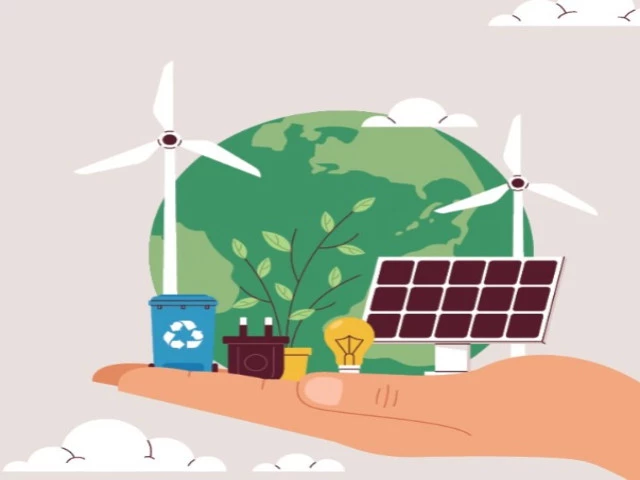Policy instability hits green funds
Report says sustainability lag puts Pakistan at risk of global trade exclusion

Pakistan's economy is grappling with deep-rooted structural weaknesses, intensifying climate risks, and a widening investment gap that threaten its long-term stability. Despite government commitments to an export-led growth model and sustainable development, experts warn that persistent challenges in attracting investment, managing climate vulnerability, and fostering sustainable business practices continue to weigh heavily on the country's prospects.
A joint report by the Association of Chartered Certified Accountants (ACCA) and the Pakistan Business Council (PBC) highlights the urgency of reforms in sustainable finance, corporate governance, and policy frameworks. The report stresses that while sustainability has become a global priority, Pakistan is lagging in integrating it meaningfully into its economic model.
One of the biggest hurdles for Pakistan is attracting foreign direct investment (FDI). Investor confidence is shaped not only by traditional financial risk but also by broader perceptions of political stability and regulatory predictability. In emerging markets such as Pakistan, these perceptions are fragile. The report notes that sustainable investment is even harder to secure, as investors weigh short-term profit models against the uncertain returns of long-term, green projects. The scale of the challenge is stark. A 2025 UN report estimated the global investment gap for achieving the UN Sustainable Development Goals (SDGs) in developing markets at $4 trillion annually. For Pakistan, this gap was equivalent to 16.1% of GDP in 2023, one of the steepest among developing nations.
Adding to the strain is policy uncertainty. As global trade becomes increasingly influenced by sustainability-linked rules, Pakistan's exporters face the risk of exclusion unless local practices align with international standards. Policymakers, businesses, and investors alike are navigating an environment where geopolitical tensions and economic shocks complicate planning and investment decisions.
Pakistan is among the world's most climate-vulnerable countries, according to the World Bank. The country's dependence on agriculture and water resources makes it particularly susceptible to climate shocks. Catastrophic floods in recent years have devastated crops, disrupted livelihoods, and fuelled food insecurity.
The report highlights that by 2050, South Asia could see up to 15% of its GDP at risk from climate-related damages, making resilience a critical policy priority. For Pakistan, this means not only investing in green energy and water security but also embedding climate resilience into national economic planning. Without such action, recurring disasters will continue to drain scarce public resources and stifle development. On the corporate front, Pakistan's businesses are beginning to acknowledge the importance of sustainability. Regulations have gradually evolved to hold companies accountable not only for their financial performance but also for environmental, social, and governance (ESG) impacts. Yet, challenges persist, noted the report.
Sustainability reporting, for instance, is gaining traction worldwide as a tool for transparency and accountability. In Pakistan, the Securities and Exchange Commission (SECP) has announced the phased adoption of International Financial Reporting Standards (IFRS) S1 and S2 sustainability disclosure standards for listed companies, effective from July 2025. While this marks a major step forward, compliance will require significant capacity building.
Many businesses, especially small and medium enterprises, face high costs of reporting, limited comparability of data, and risks of greenwashing, where companies exaggerate or misrepresent their environmental credentials. Such practices undermine investor trust and deter meaningful progress. The report underscores the need for independent assurance of sustainability disclosures to strengthen credibility.
Pakistan has taken steps to encourage green finance, including the State Bank's Green Banking Guidelines (2017) and SECP's Green Bond Framework (2021). Landmark initiatives such as WAPDA's $500 million Green Eurobond in 2021 and the Parwaaz Green Action Bond in 2025 have shown investor appetite for climate-aligned projects. Yet, these remain isolated examples.
Experts stress that without scaling up such instruments and embedding them into mainstream financial markets, Pakistan will struggle to meet its ambitious climate and development goals, which include achieving 60% renewable energy by 2030 and banning imported coal.
The ACCA-PBC report calls for urgent collaboration between investors, corporations, and regulators to align Pakistan's economy with sustainable growth. For investors, this means directing capital toward sectors with tangible sustainability benefits, such as renewable energy and water management. For businesses, it involves strengthening internal collaboration and embedding sustainability into core strategies. For regulators, the priority is to ensure a credible reporting and assurance framework while offering incentives for green investments.























COMMENTS
Comments are moderated and generally will be posted if they are on-topic and not abusive.
For more information, please see our Comments FAQ